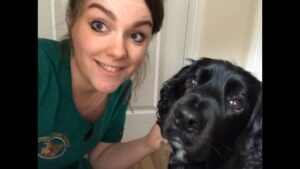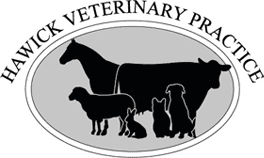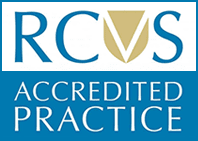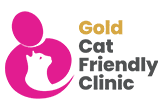May is Veterinary Nurse Awareness Month, a whole month dedicated to raising awareness of the veterinary nursing profession and the vital role they play in animal care and treatment.
Stacey is one of the head nurses at Hawick Veterinary Practice and she kindly took the time out to tell us about her life as a Veterinary Nurse.

How long have you been an RVN, and which route did you follow to qualify?
I have been a Registered Veterinary Nurse (RVN) for six and a half years. I started my HNC in Animal Nursing in 2011 at Barony College which is now SRUC Barony Campus. I went on to complete my HND in Veterinary Nursing the following year and qualified as an RVN at the end of 2013. The two-year course was very gruelling, as it left very little time for living a ‘student life’, but I made friends for life there and can genuinely say that I enjoyed it. It became a second home for all of us that stayed on campus for those two years, and the staff that worked there were so welcoming and friendly.
What attracted you to a career as a Veterinary Nurse?
I always knew from a young age that I wanted to work with animals. However, when you are young the only way to work with animals (that is well known) is a Vet. I knew I didn’t want to be a Vet, for various reasons, so I decided to look into other careers. When I was 16, I came across a job description of a Veterinary Nurse. I was astounded at the things a Veterinary Nurse was capable of doing: monitoring anaesthesia, minor operations, injections, and they could go on to specialise in different areas of veterinary nursing such as diabetes and rehabilitation. I remember at the time when I told people I wanted to be a Veterinary Nurse they asked ‘Is that even a real thing?’ which used to really annoy me. I came to Hawick Vets for work experience once a week for a whole year in my sixth year of school. I saw how hard the nurses worked, and how they cared for the ill animals they had in with them. I also saw how happy they were when their work paid off and how upset they were when it didn’t. They genuinely cared for the animals. I knew after seeing the job for myself that it was the job for me.
What does your job as a Head Veterinary Nurse entail?
As an RVN, your duties can differ from day to day depending on what your responsibilities are for that day. If you are on Theatre duties this will include admitting patients into the Practice, helping the vet draw up injections needed for a procedure, supporting and caring for nervous and scared animals who are receiving procedures, monitoring patients under anaesthetic and ensuring their vitals are stable and their anaesthetic is the correct depth. If you are on in-patient duties, you’ll be expected to care for patients who have received surgery, and patients who are ill. You would need to ensure they are clean and comfortable, monitor intravenous fluids if they are receiving it, prepare and inject prescribed medication from the vet, and ensure they are receiving the nutrition they need to get better. I have to say I think one of the most important jobs we have to do as an in-patient nurse is to spend time with them not doing anything clinical. It’s amazing the change we can see in patients once a nurse has sat with them, spoke to them and gave them some hugs. Some animals thrive on human affection, and if they don’t receive this it can actually make them very down. I could go on and on about some of the things a veterinary nurse does on a daily basis but it would probably take up the whole page!
As a Head Veterinary Nurse, I am expected to support my team on a daily basis, ensuring that they know their role for the day, and also carry out Registered Veterinary Nurse duties alongside my fellow nurses. I’m responsible for creating the weekly rotas and insurance paperwork for patients, as well as being one of two Radiation Protection Supervisors, and leaders for the Practice Standards Scheme. This is a scheme run by the Royal College of Veterinary Surgeons that ensures that practices who are accredited meet a list of high standards to ensure optimum patient care.
What is the most rewarding thing about being a Vet Nurse?
The most rewarding thing about being a Veterinary Nurse, is knowing that in some way you are making a difference to someone’s life. When that patient who has been ill for days, and finally starts to show signs of improvement, there is no better feeling than seeing that and being able to phone the owner to let them know their furry family member has improved. I think I speak for every nurse when I say that is why we are drawn to the profession in the first place.
What kind of attributes do you need to be a good Vet Nurse?
I feel that the most important attributes a veterinary nurse can have are patience, people skills, and a good team work ethic. When you work as a vet nurse, there will be challenges in your job, sometimes on a daily basis. You need to be patient, evaluate a situation, and respond carefully. Owners going through the stress of having a sick or injured animal need to be supported as well as the patient, and this is where people skills are needed. A lot of people think that the job is all about the animals, but the job is very much 50/50 between working with people and caring for animals. There is no individual that makes a practice, it is 100% a team effort. We must support our fellow colleagues in hard times, take our fair share of the workload, and be able to communicate effectively and professionally to each other at all times.
What advice would you give to someone thinking of becoming a Vet Nurse?
Be prepared to work hard, as a student and as a professional. During my two-year course, 20% of the class walked away from the course. It is an intense course which includes 52 weeks of placement alongside assignments, and multiple exams throughout the year you are required to pass in order to stay on the course. In your day to day working life, you are met with challenges which you must learn to over-come in order to carry out your duties correctly. Not every day is a win, and you need to be able to leave that at the door before you go home. The job will test you, mentally and physically. Some days you won’t get home on time, and you may miss those meals and events that have been planned due to an emergency operation or a patient that needs you to stay with them. If you are not prepared for this then you will struggle to do this job. If you decide that these are things you can do, then it is one of the most rewarding jobs you can do.
What are the best things about working at Hawick Veterinary Practice?
The main thing I love about working at Hawick Vets is my colleagues. I’ve been with Hawick Vets from the start of my course, through my exams and working for them for over six years. My colleagues have been with me through so many things in my life that I am fortunate to say they have also become my friends. They have always been supportive in any areas I wanted to excel in, and also through difficult times. There isn’t one person in the practice who doesn’t genuinely care for the animals and clients, and it is great to work with such a trustworthy team.
We are also fortunate at Hawick Vets to have some amazing clients. We are lucky enough that our clients see that we truly care about the animals and are very appreciative of the work we do.
What would be your career highlight so far?
Becoming one of the Head Veterinary Nurses at Hawick Vets would be my highlight so far. In addition to being able to support the nurse team on a daily basis, I am able to work with Vanessa, our other Head Veterinary Nurse, on improving the team’s work, and to be a voice for the nurses in the practice during Management Meetings. We are also able to attend Linnaeus Senior Nurse Meetings, where we can learn new things to help improve the practice and exchange advice on working in practice.
Have you completed any additional training to support you in your role?
I have a keen interest in laboratory work and have completed a course on Haematology and Microscope work. I have also completed a Diploma in Canine Behaviour Management to expand my understanding in this.
Next steps in career?
The great thing about working for Linnaeus are there are so many avenues you can go down and so many options for your career. For now, I love my job at Hawick Vets and the work I am doing and intend to stay here for the foreseeable future.
Thank you Stacey for sharing your story.
To find out more about the role of RVNs in veterinary practices, or if you are interested in finding out more about a career in veterinary nursing, visit the BVNA website.





